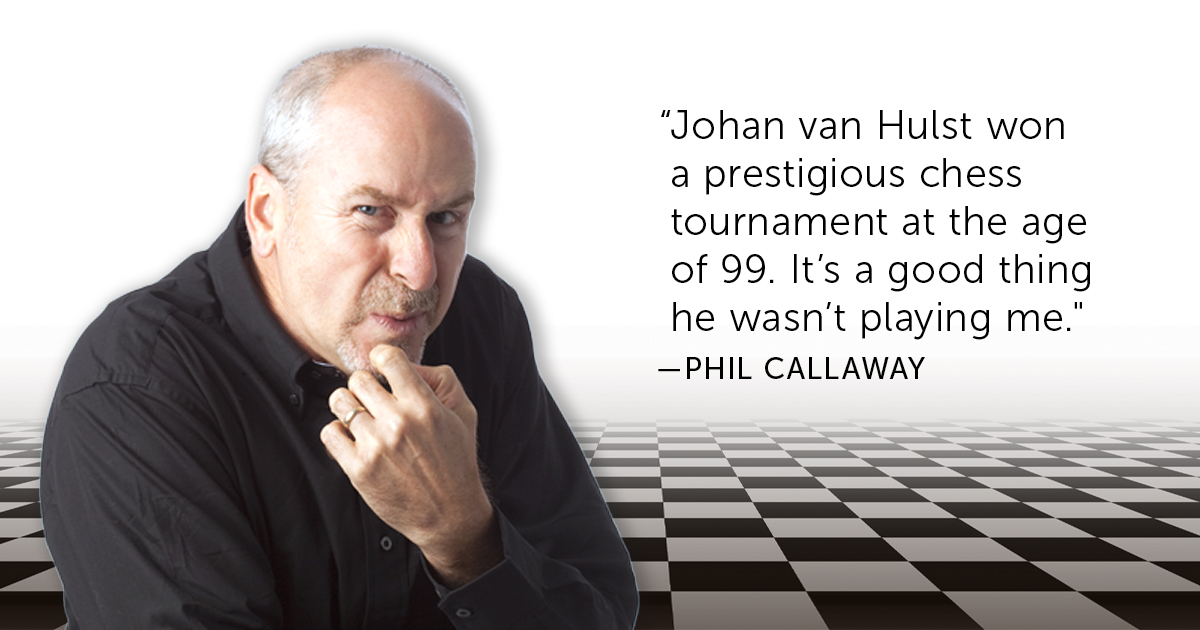A friend loves playing chess. We had lunch together and there was a checkered tablecloth between us. It took him an hour to pass the salt.
Checkmate
Years ago, I sat down for tea and crumpets with an acquaintance who had spent several years in prison. There was a chess board at our table and midway through our crumpets, I said, “Hey. Let’s play.” He shook his head.
“You don’t wanna play me,” he said. “I was the undisputed champ in jail. No one could touch me.”
“You’re bluffing,” I replied. “Besides, I’m amazing. Let’s go.”
Now, please understand that I was an accomplished checkers player once, but my knowledge of chess is woefully inadequate. I knew that the little guys march forward, the horses gallop in an “L” shape, and I was quite certain that the bishops roam diagonally. That was pretty much it.
I pushed a pawn forward and thought to myself, I wonder how many moves it will take me to lose? What’s the world record? My friend took a sip of coffee and confidently nudged one of his pawns onward. I lifted one of my horses, which I have since learned is called a knight, and set it down as if I knew what I was doing.
This continued for six or seven moves, until he stopped and said, “Huh?” Then he scratched his head and said, “No way.”
I have witnessed six or seven unexplainable happenings in my life, and this was one. I had dethroned the prison champ without knowing how. And I never told him. Until now.
Remarkable Hero
I was reminded of that chess match while reading of another chess champion.
Johan van Hulst was chairman of a chess club in Amsterdam during the Second World War. The Nazis arrived. Jewish members of the club were forbidden from playing, but they did, of course.
One night, an SS officer walked into the club wanting to join. Johan thought quickly. “Are you a Christian?” he asked. “You have to be a member of our Christian community, too, you know.” The soldier left.
“That was the most difficult day of my life. Later on, I asked myself, ‘Why not 13?’ ” JOHAN VAN HULST
Secret chess games were played at members’ houses but soon the Nazis were arresting Jews at an alarming rate, and those who sheltered them were in grave danger. So Johan hatched a daring plan.
He was president of a Christian seminary situated next to a nursery used as the last stop for Jewish children sent to concentration camps. The plan was simple but risky: documents were falsified, and children secretly handed over a hedge and smuggled out of the city under the noses of German troops.
With the nursery about to be shut down he was asked, “How many more can you smuggle out?”
“That was the most difficult day of my life,” he said, knowing those left behind would die. “I took 12 with me,” he said. “Later on, I asked myself, ‘Why not 13?’ ”
Though he is credited with helping rescue between 500 and 1,000 children, he was haunted by what he could not do.
Then Israeli Prime Minister Benjamin Netanyahu told him: “We say those who save one life save a universe. You saved hundreds of universes.”
Still, Johan admitted, “All I really think about is the things I couldn’t do—the few thousand children I wasn’t able to save.”
In 2018, he died at the age of 107, a remarkable hero willing to lay down his life for others.
Don’t Mess With Phil
American journalist Sydney Harris once said, “Regret for the things we did can be tempered by time; it is regret for the things we did not do that is inconsolable.”
Yet there is one who consoles us today: our redeemer.
When Satan reminds you of all you left undone, you remind him of what Jesus has done for you. Philippians 3:14 tells us to forget the past and look forward to what lies ahead. “I press on to reach the end of the race and receive the heavenly prize for which God, through Christ Jesus, is calling us” (New Living Translation).
By the way, Johan won a prestigious chess tournament at the age of 99. It’s a good thing he wasn’t playing me.










Leave a Comment